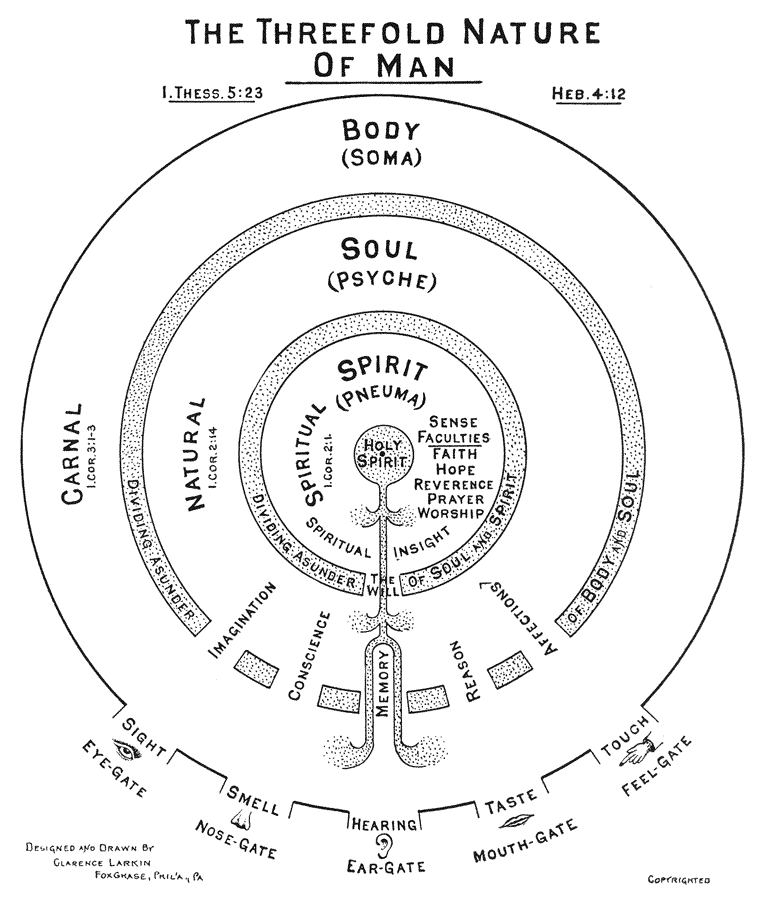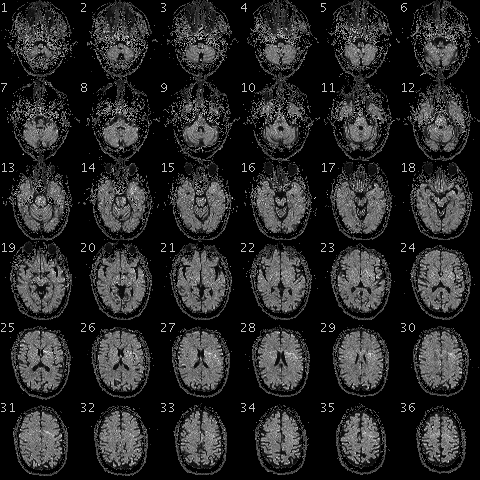
Recently on the blog, some questions have arisen about whether biology plays a role in determining sexual orientation, and if so to what extent. Even though the relevant disciplines are not my area of expertise, I felt that, as a biologist, I should be at least broadly familiar with the available data and schools of thought. I figured I would investigate what is known, what the open questions are, and if it was worthwhile, summarize my findings for this blog. I don’t expect to provide the definitive Christian perspective on the topic; my goal was mainly to present the evidence, whatever it may be (and I honestly didn’t know what I’d find), so that we could have a more informed discussion.
While I continue to research the literature, I have already started thinking about how to organize and present what I’m learning. And I realized that how I generally think about the connection between the mind and the body framed how I approached the biology of orientation. I began to suspect the same is true for many of us, so I think it’s worth getting it out in the open first.
The two main approaches to this relationship are monism and dualism. Monists hold that the mind arises entirely from the physical structure and processes of the brain. Dualists characterize the mind and/or the soul as having some non-physical component entirely separate from the brain. Naturally, there is a lot of diversity and nuance on both sides that is not captured by that dichotomy. My intent here is not to provide a comprehensive treatment of the mind-body problem, but instead of highlight the primary difference between the two and how it pertains to discussions of sexual orientation.
Now, strictly speaking, both monism and dualism are compatible with a model of orientation that is fully determined by biology, or one that is entirely learned or chosen, or anything between. Monism still allows for learned behaviors; no one is born knowing calculus, but that doesn’t mean that the biology of their brain can’t fully mediate their ability to integrate. And dualism permits for a connection between physical bodies and non-physical minds; I doubt many would deny that there is a physical component to hunger or thirst.

Nevertheless, monists and dualists will have certain divergent tendencies. For a monist, the idea that sexual orientation would be correlated with biological features is a natural outgrowth of that general perspective. It is not a question of if, but of how. There is still plenty of room for uncertainty in areas such as heritability — just because something is biological doesn’t mean that it is completely or even partially inherited — but a basic question has already been answered by opting for monism.
For a dualist, however, everything is still up for grabs. Orientation may be entirely a function of the non-physical mind, in which case there would be no biological correlates or markers for it. And if you are the sort of Christian dualist who further believes that the mind and/or soul are given directly from God, and that God has declared homosexuality a sin, it will be very difficult to fathom how or why God would give anyone a homosexual soul. The idea that orientation would be even partially determined by biology is thus essentially ruled out deductively, before any observations have been made.
Anecdotally, I gather that many Christians have some form of this particular dualist perspective, whether they are aware of it or not. Given all of the verses that talk about the body, spirit, and soul, this is perfectly understandable. It is my hypothesis, then, that this perspective makes it particularly difficult for these Christians to entertain the idea that sexual orientation could be even partially determined by biology. And if I’m correct, then having a conversation about scientific studies isn’t going to get very far if we don’t first acknowledge how our assumptions about how the mind and body work.
So, how do we proceed? I’m not going to try to convert everyone to monism or dualism; I don’t expect that is possible, nor do I think it necessary. I do think it will be helpful for all of us to come to the table having reflected on the assumptions that come with our monist or dualist perspective. For what it’s worth, I would describe myself as a monist. My concept of the mind has been influenced by having spent a lot of time programming computers in general, and doing some research involving applications of machine learning techniques in particular; the writings of Douglas Hofstadter are also a strong point of reference.
I’d love to hear from you, whether you think my hypothesis about the significance of monism/dualism to conversations about the biology of sexual orientation holds water. Are there other assumptions that also factor into the conversation, perhaps even more significantly than the mind-body problem? Do you agree that the sort of dualism I describe is common among Christians? What other perspectives on the question have you encountered in the church?
This looks to be the prologue for a series of as-yet-unknown length on the topic of biology and sexual orientation. The next installment will appear at the end of June, in my usual Science in Review time slot.
Andy has worn many hats in his life. He knows this is a dreadfully clichéd notion, but since it is also literally true he uses it anyway. Among his current metaphorical hats: husband of one wife, father of two teenagers, reader of science fiction and science fact, enthusiast of contemporary symphonic music, and chief science officer. Previous metaphorical hats include: comp bio postdoc, molecular biology grad student, InterVarsity chapter president (that one came with a literal hat), music store clerk, house painter, and mosquito trapper. Among his more unique literal hats: British bobby, captain’s hats (of varying levels of authenticity) of several specific vessels, a deerstalker from 221B Baker St, and a railroad engineer’s cap. His monthly Science in Review is drawn from his weekly Science Corner posts — Wednesdays, 8am (Eastern) on the Emerging Scholars Network Blog. His book Faith across the Multiverse is available from Hendrickson.

Given that Christianity usually speaks of at least the body and the soul, duality is pretty much assumed, I think. When I was taking classes at seminary, Greek in particular, I did a paper trying to figure out a related problem: are we to consider ourselves a duality, or a threesome; the body, soul and spirit of your chart. My conclusion was that Paul does speak of all three, therefore he at least believed in all three.
I’ve been reading a lot of Douglas Hofstadter; recently I acquired my own copy of his Metamagical Themas. (A new book, Surfaces and Essences, has just been reviewed by Science). I hope I am not far wrong in thinking that he is essentially a monist; that although our atoms and molecules combine in such a way as to believe that we exist, we really don’t and when we die, that is it.
Monism doesn’t necessarily deny the ontological validity of a mind or a soul. Rather, it says that the activity of the mind or the soul is mediated by the physical body (generally the neurons of our brain and sense organs, under our current understanding). The alternative, dualism, says that there are processes which our mind or soul undertake which are entirely non-physical, i.e. do not involve neural activity.
Whether the soul and the spirit are distinct is a separate, interesting question. There is some evidence of a distinction in the New Testament, but it also bears a resemblance to the Aristotelian philosophy of the day. So it’s not clear to me whether Paul was using that terminology because it represented contemporary understanding or because it is an accurate description of reality, or both.
I would agree that, on the question of the mind-body problem, Hofstadter is a monist. I would also agree that he is additionally a physicalist and an atheist, believing that the physical realm represents the sum total of reality, and therefore there is no supernatural God. On these latter points, he and I diverge.
I’d love for you to do a post on the biological basis of the soul! As a neuroscientist and a follower of Jesus, I definitely feel conflicted in trying to understand how any sort of dualism could function physically. (How does our soul interact with our brain?) Eph. 2 reconciles this idea for me in the sense that I understand that something outside of my physical/mental existence has been created in my by God in Christ, and that only through Him can I experience the unseen (i.e., not-physical) part of the world.
On the topic of sexual orientation, I’m not really sure I agree with you, though. I rarely hear Christians disagree with the idea that some people are more prone to alcoholism than others…
I’m not sure I could do the topic justice to the satisfaction of actual neuroscientists, but I’ll keep your suggestion in mind. It is a topic which I find very interesting.
I will add that both dualist and monist Christians at some point have to address the question of how the spiritual/supernatural interacts with the physical. Dualism locates at least part of that interface within each individual, while monism makes it external to the individual.
Your point about alcoholism is well taken. I would add that I have encountered plenty of people who object to even the notion that alcoholism is partially determined biologically, but ultimately that’s my anecdotes vs your anecdotes, so I’m not sure where that leaves us. Perhaps because few people claim alcoholism as a valid lifestyle option, there is less reflection on the nuances of it.
Andy:
Interesting idea. I wrote a blog on this topic (biology of sexual orientation) that I never published because it was too inflammatory. If you email me back-channel I’ll send it to you so you would at least have the references.